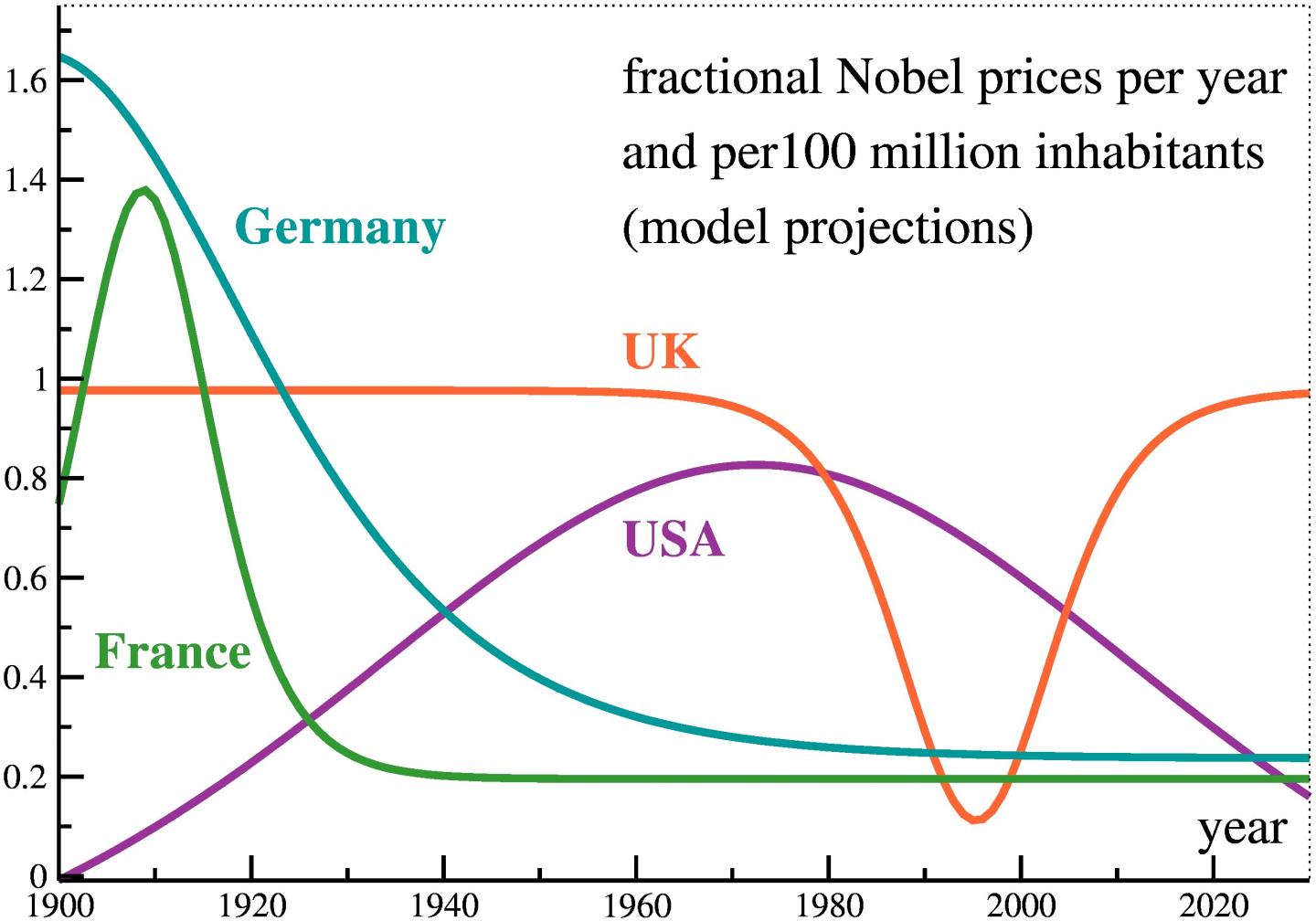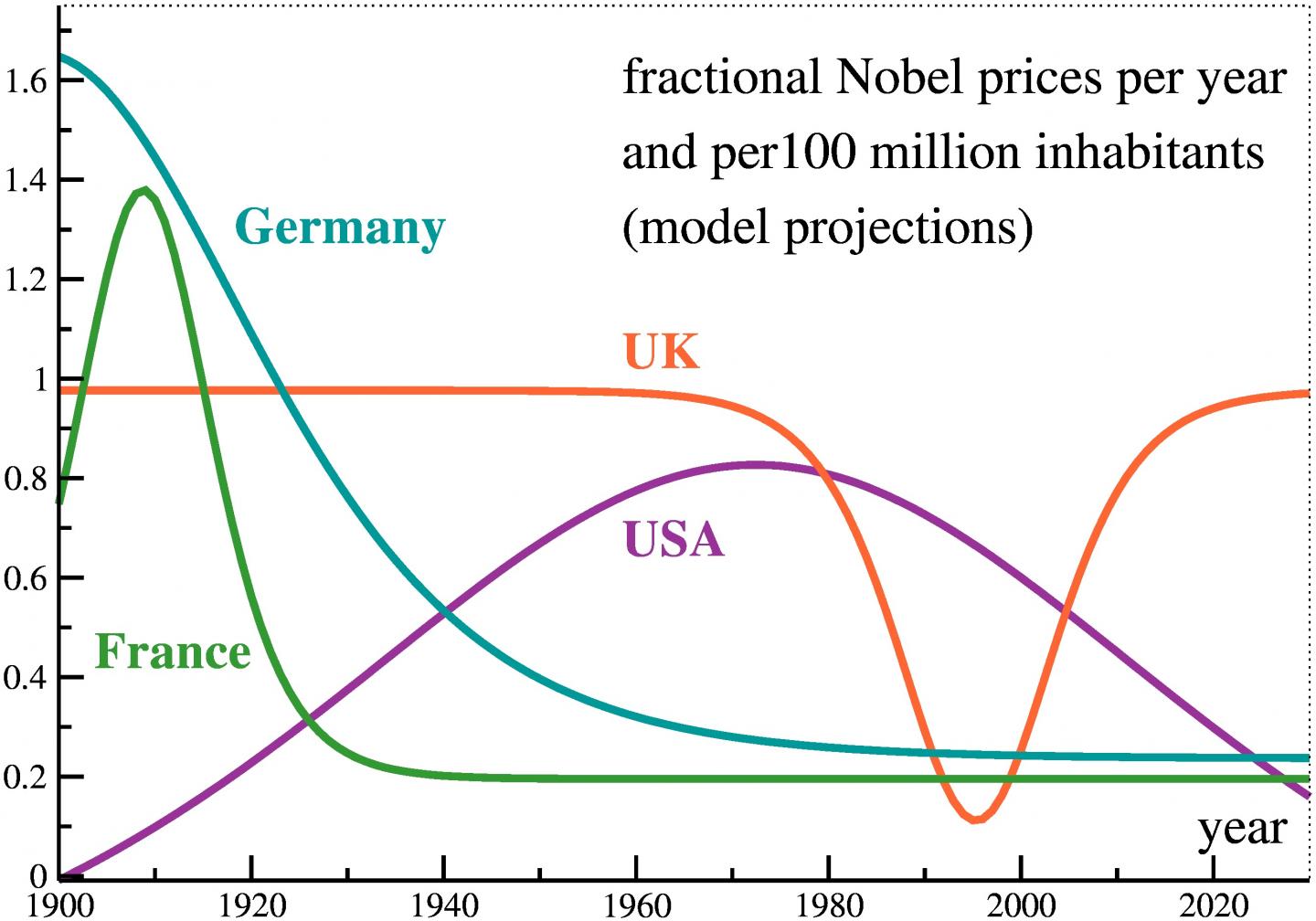
Credit: Claudius Gros, Goethe University
FRANKFURT. Since first being awarded in 1901, most Nobel Prizes for science have gone to the USA, the United Kingdom, Germany and France. An empirical study by Professor Claudius Gros from the Institute for Theoretical Physics at the Goethe University in Frankfurt has now shown that the Nobel Prize productivity in these countries is primarily determined by two factors: a long-term success rate, and periods during which each country has been able to win an especially large number of Nobel Prizes.
For the study, Nobel Prizes for physics, chemistry and medicine were assigned proportionately, since up to three scientists can share the prize. The success rates were calculated on the basis of population figures. For France and Germany, the periods of increased scientific creativity occurred around 1900, whereas for the USA it occurred in the second half of the 20th century.
"The US era is approaching its end," states Claudius Gros. "Since its zenith in the 1970s, US Nobel Prize productivity has already declined by a factor of 2.4." According to his calculations, a further decline is foreseeable. "Our model predicts that starting in 2025 the productivity of the USA will be below that of Germany, and from 2028, below that of France as well."
With a nearly constant, very high success rate per capita, Great Britain occupies a special position with regard to Nobel Prizes. It remains uncertain, however, whether Great Britain will be able to maintain this success, especially in view of the increasing industrialization of research.
"National research advancement can undoubtedly also be successful independent of Nobel Prize productivity," Claudius Gros stresses. "Especially because new areas of research such as the computer sciences – a typical US domain – are not included." It therefore remains open whether the decline in Nobel Prize productivity is cause for concern, or merely an expression of a new orientation toward more promising research fields.
###
A chart to download can be found at: http://www.uni-frankfurt.de/71881831
Chart: Claudius Gros, Goethe University
Publication:
Claudius Gros: An empirical study of the per capita yield of science Nobel Prizes: Is the US era coming to an end?, in: Royal Society Open Science (2018) http://rsos.royalsocietypublishing.org/content/5/5/180167
Claudius Gros: Pushing the complexity barrier: diminishing returns in the sciences, in: Complex Systems 21, 183 (2012). https://arxiv.org/abs/1209.2725
Further information: Prof. Claudius Gros, Department for Theoretical Physics, Faculty of Physics, Riedberg Campus, Tel.:+49(0)69 798-47818, [email protected].
Current news about science, teaching, and society in GOETHE-UNI online (http://www.aktuelles.uni-frankfurt.de)
Goethe University is a research-oriented university in the European financial centre Frankfurt The university was founded in 1914 through private funding, primarily from Jewish sponsors, and has since produced pioneering achievements in the areas of social sciences, sociology and economics, medicine, quantum physics, brain research, and labour law. It gained a unique level of autonomy on 1 January 2008 by returning to its historic roots as a "foundation university". Today, it is among the top ten in external funding and among the top three largest universities in Germany, with three clusters of excellence in medicine, life sciences and the humanities. Together with the Technical University of Darmstadt and the University of Mainz, it acts as a partner of the inter-state strategic Rhine-Main University Alliance. Internet: http://www.uni-frankfurt.de
Publisher: The President of Goethe University Editor: Dr. Anke Sauter, Science Editor, International Communication, PR & Communication Department, Theodor-W.-Adorno-Platz 1, 60323 Frankfurt am Main, Tel: +49(0)69 798-13066, Fax +49(0)69 798-761 12531, [email protected].
Publisher: The President of Goethe University Editor: Dr. Anne Hardy, Referee for Science Communication, PR & Communication Department, Theodor-W.-Adorno-Platz 1, 60323 Frankfurt am Main, Tel: (069) 798-13035, Fax: (069) 798-763 12531.
Media Contact
Claudius Gros
[email protected]
49-697-984-7818
@goetheuni
http://www.uni-frankfurt.de
Original Source
https://aktuelles.uni-frankfurt.de/englisch/for-how-long-will-the-usa-remain-the-nobel-prize-leader/





